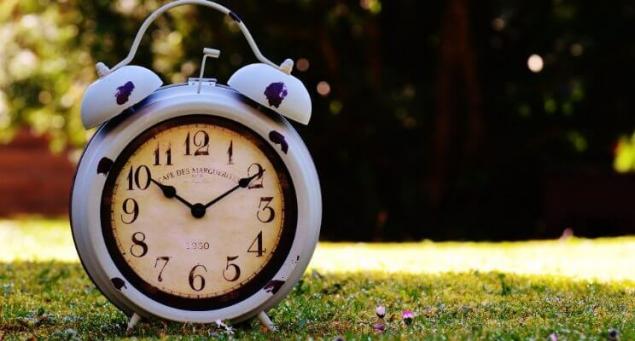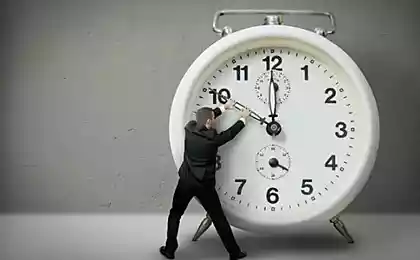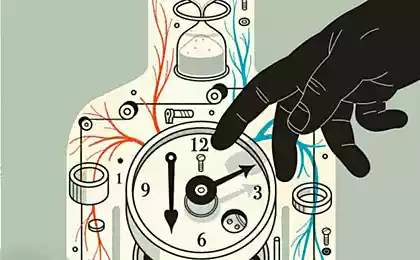787
The relationship between success and an early awakening: how to become a lark
"It's good to get up before dawn, this habit contributes to the health,
wealth and wisdom"
Aristotle
Larks are born or made? In my case, definitely become. In my youth I rarely went before midnight and almost always slept for a long time. Usually I walked in a normal pace of life only late in the evening.

But after a while I was even in my own life to notice the correlation between success and early awakening. On those rare occasions when I woke up, I noticed that my productivity was almost always higher, not only in the morning but all day. I also felt that feel much better. In order to increase activity, I decided to develop the habit to get up early. The next day I set the alarm for 5 am, and...
...got up a little before noon. Hmm...
I tried again and again. Each time the result is almost unchanged. I decided that I don't have the gene "lark". Whenever my alarm rang, my first thought was always to stop that hideous noise and return to sleep. I postponed the idea of acquiring the habit for a few years, but one day stumbled upon sleep studies, which revealed to me that I incorrectly approached the problem. Taking some ideas from these studies, I have learned to constantly get up early.
It is difficult to become a "lark" using the wrong strategy. But with the right algorithm is relatively simple.
The most common mistake in the method is. You assume that, intending to get up early to cost before you go to sleep. Are you counting how much you sleep normally, and then just shift your schedule by a few hours ago. If you normally sleep from midnight to 8 am, then to Wake up at 6 in the morning, you decide to go to bed at 10 PM. Sounds logical, but usually it fails.
There are two main theories as to the scheme of sleep.
One of them stipulates that you go to bed and Wake up at the same time each day. This is how to set the alarm clock at the start and end of the dream. You are trying to bed every night same time. It is important for modern society because we need to have a pre-determined agenda, and we need to provide yourself enough rest.
The second theory says that you need to listen to your body. Go to bed when you are tired and Wake up when you take for granted. This judgment is based on knowledge of biology.The body should know how much rest we need, so we should listen to him.
Through trial and error I have determined for myself that both approaches are only applicable in half. None of them are ideal if you need to be productive. And here's why.

The best solution for me was a mixture of both methods. It's very simple, and many early risers do so, without even thinking about it, however for me it was a revelation. The solution was to go to bed when they really want (and only then), and Wake up to the alarm at the same time (7 days a week). Thus, I always get up at the same time (in my case 5 am), but go to sleep every single time.
I go to sleep, when I'm no longer able to stay awake.
My drowsiness I check like this: if I can't read more than one or two pages of the book, not huddling, then it's time to sleep.
Most often, lying in bed, I fall asleep in 3 minutes. I go, sit back and instantly turn off. Sometimes I go to bed at 21.30, in other cases I don't sleep until midnight. I often go to sleep between 10 and 11 PM. If I don't quite want to sleep, I'm awake until, till my eyes start to close. Reading is a great activity for a while, until I feel no longer able to read.
Every morning when my alarm goes off, I unplug it, a few seconds stretch out, then sit down. I don't even think about it. I realized that the more time I spend in the lift, the greater the likelihood that I would try to lie down again. So I don't allow myself to think in my mind that it would be nice to go back to sleep after the alarm. Even if I want to sleep, I always Wake up instantly.
After a few days of using this method, I found that my circuit sleep harmoniously moved in a natural rhythm. If I sleep too little one night, then the next day I felt sleepy earlier and slept longer. If I felt a lot of energy and wasn't tired, I slept less. My body learned to "mute" me because he knew I would Wake up at a set time, and that time is not discussed.
A side effect was that I was sleeping 90 minutes a night less, but nevertheless feel well-rested. All the time I was in bed, I had went to sleep.
I believed that most people suffering from insomnia are those who goes to sleep when not quite need it. If you don't want to sleep and can't fall asleep quickly, get up and watch some time. Don't sleep until your body begins to produce hormones that turns off your consciousness. If you are just going to go to bed when you want and Wake up at a fixed time, you recover from insomnia. The first night you'll stay awake a long time, but fell asleep instantly. The next day you may feel tired, got up too early and slept for a few hours, but a little to torment you the next night I go to bed early. After a few days you will be included in the scheme: to go to sleep approximately at the same time, and fall asleep immediately.
So, if you want to start early (or just better control your sleep mode), try this. Go to bed only when you can no longer stay awake, and Wake up at a set time every day.

I decided to create a step-by-step algorithm and to clarify some of the details.
First, to go to sleep when you really want to do this right, you need to merge the understanding and common sense.
If you're in any way stimulate yourself before bed, you will be able to stay awake much longer and it is easy to resist sleepiness. In College, I participated in the poker games that lasted until dawn, and then we went to Breakfast. I can easily stay awake more than usual, if I work, hang out with friends or some other way stimulate yourself.
But I did not mean it, to mention the drowsiness. I talked about determining when you can't read several pages of text without losing concentration. This does not mean that you need to wait until you fall from exhaustion.
Attack of sleepiness, I'm talking about starts when your brain begins to produce hormones that turn you off. This differs from simple fatigue. You feel yourself falling asleep. But for that to happen, you need to create the right conditions. Before bed you need some time to do nothing. The best way to relax before going to sleep I think reading. Some say it's not the best option, in bed to sleep, not to read. I have never had a problem with it. When I can't read, I just put my book and fall asleep. You can read and on a chair, if you please.
Here is another test of sleepiness. Ask yourself: "If I sleep now I fall asleep?" If you think it will take more than 15 minutes, keep awake.
Once you have chosen the time at which you will Wake up, sleep duration levelled immediately. First you will notice large fluctuations: too long to Wake one day and too short the next. But, in the end, you will feel when you have to lie down to fall asleep and the next morning Wake up refreshed.
As a "fuse" not to sleep too little at first, select a "border" — the time at which you are guaranteed to go to sleep, even if not enough want. For myself, I was able to determine the minimum required I sleep. The best option for me is 6.5 hours per day, but I can sleep 5 hours and feel good, unless, of course, not to do it every night. The maximum sleep time for me is 7.5 hours. Before I started to apply this technique, I often sleep 8-9 hours, sometimes even 10, if I'm really tired.
If you during the day, drink caffeine, it can affect your sleep cycles. If you are addicted to caffeine, the first drop this habit. Don't expect natural sleepiness at the right time, if you himichat with his brain.
Once the habit is established, it becomes subconscious. You will be able to do vigorous activity, work or play video games, and nevertheless will know when you go to sleep. And this may happen each time in a different time. Test of sleepiness is important in setting habits, but after a while the inner signals of the body make it unnecessary.
Of course, you can Wake up later, if necessary. If I don't sleep until three in the morning, I set the alarm for 5 am. But the next day I go back to the regular schedule.
I recommend waking up at the same time for 30 days to anchor the habit and after that you get used so that you will be hard to go back to sleep. One day I decided to sleep in on Saturday and did not set the alarm, but automatically woke up at 4.58. I tried to go back to sleep, but I failed. So. After posting habits becomes easy to Wake up if you go to bed when tired.
If you have children, try to adapt. My kids 1 and 5 years. Sometimes they Wake me in the middle of the night. My daughter used to appear suddenly in the bedroom to tell me and my wife about my dreams, or just to talk. And I know how it feels when the baby wakes up every few hours. If you are in the same situation, the rule is: sleep when you can. Children do not like to fit into schedules.
If you can't get out of bed by an alarm clock, most likely it is due to the lack of self-discipline. If you are disciplined enough, you stand anyway. Motivation can also help, but it usually works only a few days. Discipline is like a muscle. The more you work on it, the more you can count on it. We all have the discipline (you can hold your breath?), but not all develop it. As soon as your discipline develops, tests like that to get out of bed, are simple and trivial. But if your self discipline is weak, this may seem hard obstacle.

Why you need to get up early?
The main reason I would say that you will have a lot more time on things that are far more interesting than sleep.
Again, I got an extra 10-15 hours a week using this method. This extra time is really noticeable. At 6.30 am, I already did exercises, took a shower, had Breakfast and ready to go. I can spend a lot of time every day for productive work, which I usually finish by 5 PM (and that includes personal "work": check mail, pay bills, get my daughter from kindergarten, etc.). This gives me 5-6 personal hours each evening that I can spend on family, leisure, reading, etc. and, best of all, at this time, I'm still full of energy. What I have time for all I care, makes me calm and optimistic.
Think about what you could do in extra time. Even 30 extra minutes a day is enough to do daily exercises, read a book or two a month, to blog, meditate, cook healthy meals, learn to play a musical instrument etc.
Also interesting: How to learn to get up at 5 am
The power of mornings: why successful people get up at 4:00
A little extra time every day for a year turns into a huge amount. 30 minutes a day is 182.5 hours a year. This is more than a month of work full time (40 hours per week). Double this number if you receive 60 additional minutes per day, triple if 90.
I was able to save about 90 minutes a day. It's like getting a free additional year after 10 years. I use this time on things that previously I didn't have enough time or energy. That's fine.published
Author: Steve Pavlina
Source: www.allstevepavlina.ru/how-to-become-an-early-riser
wealth and wisdom"
Aristotle
Larks are born or made? In my case, definitely become. In my youth I rarely went before midnight and almost always slept for a long time. Usually I walked in a normal pace of life only late in the evening.

But after a while I was even in my own life to notice the correlation between success and early awakening. On those rare occasions when I woke up, I noticed that my productivity was almost always higher, not only in the morning but all day. I also felt that feel much better. In order to increase activity, I decided to develop the habit to get up early. The next day I set the alarm for 5 am, and...
...got up a little before noon. Hmm...
I tried again and again. Each time the result is almost unchanged. I decided that I don't have the gene "lark". Whenever my alarm rang, my first thought was always to stop that hideous noise and return to sleep. I postponed the idea of acquiring the habit for a few years, but one day stumbled upon sleep studies, which revealed to me that I incorrectly approached the problem. Taking some ideas from these studies, I have learned to constantly get up early.
It is difficult to become a "lark" using the wrong strategy. But with the right algorithm is relatively simple.
The most common mistake in the method is. You assume that, intending to get up early to cost before you go to sleep. Are you counting how much you sleep normally, and then just shift your schedule by a few hours ago. If you normally sleep from midnight to 8 am, then to Wake up at 6 in the morning, you decide to go to bed at 10 PM. Sounds logical, but usually it fails.
There are two main theories as to the scheme of sleep.
One of them stipulates that you go to bed and Wake up at the same time each day. This is how to set the alarm clock at the start and end of the dream. You are trying to bed every night same time. It is important for modern society because we need to have a pre-determined agenda, and we need to provide yourself enough rest.
The second theory says that you need to listen to your body. Go to bed when you are tired and Wake up when you take for granted. This judgment is based on knowledge of biology.The body should know how much rest we need, so we should listen to him.
Through trial and error I have determined for myself that both approaches are only applicable in half. None of them are ideal if you need to be productive. And here's why.
- If you go to bed and get up at a fixed time, sometimes you have to go to bed, when you have not experience physical need. If you need more than five minutes to fall asleep, so you don't want to sleep. You are wasting time while awake in bed. Another problem: you assume that every day you need the same number of hours of sleep, but it's wrong. The duration of sleep should vary from day to day.
- If your sleep based on what the body tells you, you're more likely sleep more than necessary. And in most cases is far more about 10-15 hours a week (that is, the dream will leave almost the same time as in wakefulness). Many people that regulate your sleep so sleep more than eight hours a day. Usually this is too much. Moreover, your morning will be less predictable if you will Wake up at different times. Also due to the mismatch between your biological rhythms and the 24-hour day, you may notice the offset of their sleep periods.

The best solution for me was a mixture of both methods. It's very simple, and many early risers do so, without even thinking about it, however for me it was a revelation. The solution was to go to bed when they really want (and only then), and Wake up to the alarm at the same time (7 days a week). Thus, I always get up at the same time (in my case 5 am), but go to sleep every single time.
I go to sleep, when I'm no longer able to stay awake.
My drowsiness I check like this: if I can't read more than one or two pages of the book, not huddling, then it's time to sleep.
Most often, lying in bed, I fall asleep in 3 minutes. I go, sit back and instantly turn off. Sometimes I go to bed at 21.30, in other cases I don't sleep until midnight. I often go to sleep between 10 and 11 PM. If I don't quite want to sleep, I'm awake until, till my eyes start to close. Reading is a great activity for a while, until I feel no longer able to read.
Every morning when my alarm goes off, I unplug it, a few seconds stretch out, then sit down. I don't even think about it. I realized that the more time I spend in the lift, the greater the likelihood that I would try to lie down again. So I don't allow myself to think in my mind that it would be nice to go back to sleep after the alarm. Even if I want to sleep, I always Wake up instantly.
After a few days of using this method, I found that my circuit sleep harmoniously moved in a natural rhythm. If I sleep too little one night, then the next day I felt sleepy earlier and slept longer. If I felt a lot of energy and wasn't tired, I slept less. My body learned to "mute" me because he knew I would Wake up at a set time, and that time is not discussed.
A side effect was that I was sleeping 90 minutes a night less, but nevertheless feel well-rested. All the time I was in bed, I had went to sleep.
I believed that most people suffering from insomnia are those who goes to sleep when not quite need it. If you don't want to sleep and can't fall asleep quickly, get up and watch some time. Don't sleep until your body begins to produce hormones that turns off your consciousness. If you are just going to go to bed when you want and Wake up at a fixed time, you recover from insomnia. The first night you'll stay awake a long time, but fell asleep instantly. The next day you may feel tired, got up too early and slept for a few hours, but a little to torment you the next night I go to bed early. After a few days you will be included in the scheme: to go to sleep approximately at the same time, and fall asleep immediately.
So, if you want to start early (or just better control your sleep mode), try this. Go to bed only when you can no longer stay awake, and Wake up at a set time every day.

I decided to create a step-by-step algorithm and to clarify some of the details.
First, to go to sleep when you really want to do this right, you need to merge the understanding and common sense.
If you're in any way stimulate yourself before bed, you will be able to stay awake much longer and it is easy to resist sleepiness. In College, I participated in the poker games that lasted until dawn, and then we went to Breakfast. I can easily stay awake more than usual, if I work, hang out with friends or some other way stimulate yourself.
But I did not mean it, to mention the drowsiness. I talked about determining when you can't read several pages of text without losing concentration. This does not mean that you need to wait until you fall from exhaustion.
Attack of sleepiness, I'm talking about starts when your brain begins to produce hormones that turn you off. This differs from simple fatigue. You feel yourself falling asleep. But for that to happen, you need to create the right conditions. Before bed you need some time to do nothing. The best way to relax before going to sleep I think reading. Some say it's not the best option, in bed to sleep, not to read. I have never had a problem with it. When I can't read, I just put my book and fall asleep. You can read and on a chair, if you please.
Here is another test of sleepiness. Ask yourself: "If I sleep now I fall asleep?" If you think it will take more than 15 minutes, keep awake.
Once you have chosen the time at which you will Wake up, sleep duration levelled immediately. First you will notice large fluctuations: too long to Wake one day and too short the next. But, in the end, you will feel when you have to lie down to fall asleep and the next morning Wake up refreshed.
As a "fuse" not to sleep too little at first, select a "border" — the time at which you are guaranteed to go to sleep, even if not enough want. For myself, I was able to determine the minimum required I sleep. The best option for me is 6.5 hours per day, but I can sleep 5 hours and feel good, unless, of course, not to do it every night. The maximum sleep time for me is 7.5 hours. Before I started to apply this technique, I often sleep 8-9 hours, sometimes even 10, if I'm really tired.
If you during the day, drink caffeine, it can affect your sleep cycles. If you are addicted to caffeine, the first drop this habit. Don't expect natural sleepiness at the right time, if you himichat with his brain.
Once the habit is established, it becomes subconscious. You will be able to do vigorous activity, work or play video games, and nevertheless will know when you go to sleep. And this may happen each time in a different time. Test of sleepiness is important in setting habits, but after a while the inner signals of the body make it unnecessary.
Of course, you can Wake up later, if necessary. If I don't sleep until three in the morning, I set the alarm for 5 am. But the next day I go back to the regular schedule.
I recommend waking up at the same time for 30 days to anchor the habit and after that you get used so that you will be hard to go back to sleep. One day I decided to sleep in on Saturday and did not set the alarm, but automatically woke up at 4.58. I tried to go back to sleep, but I failed. So. After posting habits becomes easy to Wake up if you go to bed when tired.
If you have children, try to adapt. My kids 1 and 5 years. Sometimes they Wake me in the middle of the night. My daughter used to appear suddenly in the bedroom to tell me and my wife about my dreams, or just to talk. And I know how it feels when the baby wakes up every few hours. If you are in the same situation, the rule is: sleep when you can. Children do not like to fit into schedules.
If you can't get out of bed by an alarm clock, most likely it is due to the lack of self-discipline. If you are disciplined enough, you stand anyway. Motivation can also help, but it usually works only a few days. Discipline is like a muscle. The more you work on it, the more you can count on it. We all have the discipline (you can hold your breath?), but not all develop it. As soon as your discipline develops, tests like that to get out of bed, are simple and trivial. But if your self discipline is weak, this may seem hard obstacle.

Why you need to get up early?
The main reason I would say that you will have a lot more time on things that are far more interesting than sleep.
Again, I got an extra 10-15 hours a week using this method. This extra time is really noticeable. At 6.30 am, I already did exercises, took a shower, had Breakfast and ready to go. I can spend a lot of time every day for productive work, which I usually finish by 5 PM (and that includes personal "work": check mail, pay bills, get my daughter from kindergarten, etc.). This gives me 5-6 personal hours each evening that I can spend on family, leisure, reading, etc. and, best of all, at this time, I'm still full of energy. What I have time for all I care, makes me calm and optimistic.
Think about what you could do in extra time. Even 30 extra minutes a day is enough to do daily exercises, read a book or two a month, to blog, meditate, cook healthy meals, learn to play a musical instrument etc.
Also interesting: How to learn to get up at 5 am
The power of mornings: why successful people get up at 4:00
A little extra time every day for a year turns into a huge amount. 30 minutes a day is 182.5 hours a year. This is more than a month of work full time (40 hours per week). Double this number if you receive 60 additional minutes per day, triple if 90.
I was able to save about 90 minutes a day. It's like getting a free additional year after 10 years. I use this time on things that previously I didn't have enough time or energy. That's fine.published
Author: Steve Pavlina
Source: www.allstevepavlina.ru/how-to-become-an-early-riser
The Relationship Between Success and Early Awakening: How to Become a Lark
How to deal with addiction to procrastinating.























